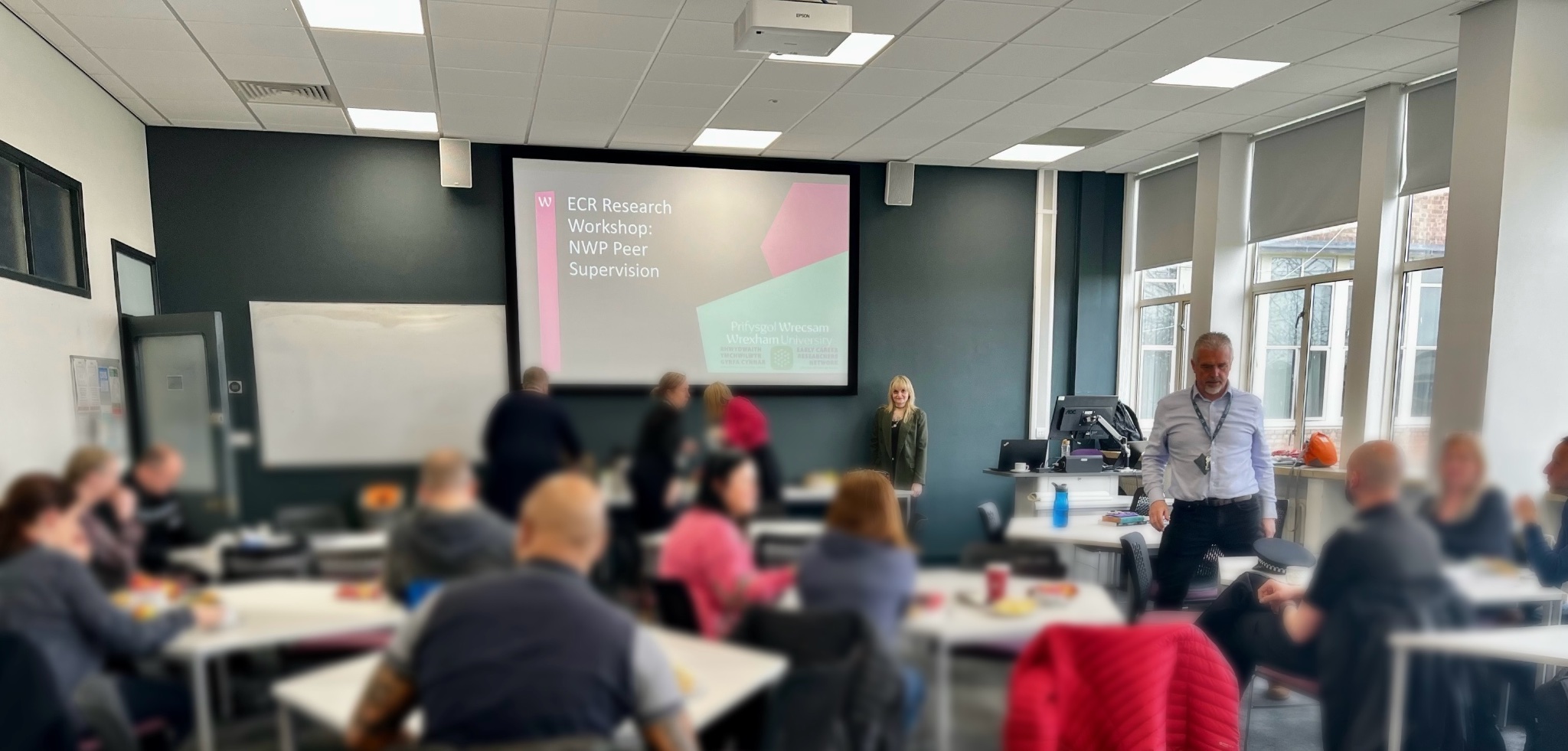
Current Projects
Content Accordions
- World Health Organisation - Evid Action programme evaluation
Wrexham staff (Prof. Wulf Livingston) are involved in a three-year evaluation of a (€10m) WHO programme funded by the European Union to address alcohol-related harms.
The Evid Action programme has three key focuses; links between alcohol consumption and cancer, development of brief interventions within the work place, and developing community capacity (public health and researchers).
The evaluation team have two core objectives, establish that the intended programme of activity has taken place and consider the impact of the programme. The evaluation project runs from June 2023 - October 2025. The evaluation project is awarded to Figure 8 Consultancy and Wrexham are a collaborating partner.
- Navigating the Storm Workbook Pilot
Dr Tegan Brierley-Sollis, Karen Rhys-Jones, Lisa Formby, Karen Tilby, Deborah Robert and Paula Wood are undertaking a project involving primary schools in the local area piloting a workbook created in-house.
The workbook, based on the Navigating the Storm animation, has been created to support emotion regulation and involves a range of activities which can be used in class or through 1:1 settings. W
The study will involve different schools attending a training session to find out more about the themes of the workbook. Participants will then be asked to deliver the workbook over a pilot period, after which, the research team will follow up with participants to gather experiences of using the workbook

- Evaluation of Buvidal
Wrexham staff (Prof. Wulf Livingston) are involved in a programme evaluating the impact of the rollout in Wales of an alternative opioid substitute medication/therapy - Buvidal.
This project is funded by the Welsh Government and is awarded to and led by Professor Katy Holloway and supported by staff from University of South Wales. The project is a comprehensive (£400k) mixed methods policy and practice evaluation, and seeks to establish the nature of current provision, how it does or does not work, its potential and actual impacts on drug related harms, and its relative economic merits in comparison to other OST methods etc. Wrexham staff are providing a specific role in regards to the Contribution Analysis approach and contributing to data collection.
- Vicarious Trauma and Secondary Traumatic Stress – North Wales Police
Dr Tegan Brierley-Sollis, Nick Hoose, Andrew Crawford, and Dr Sarah Dubberley have been awarded funding from the Learned Society of Wales and ACE Hub Wales to carry out a project exploring the effectiveness of a peer-to-peer reflective supervision model in relation to vicarious trauma and secondary traumatic stress.
Reflective supervision is considered to be a cornerstone of effective social work practise and in reducing the emotional impact of secondary stress and vicarious trauma on those practitioners engaged in relationship-based work with individuals and families. Whilst good supervision is time consuming and requires an investment of resources, there is consensus that failing to provide this emotional support to practitioners increases risk of burnout and long lasting impacts on wellbeing; therefore, it is in the interests of agencies to recognise and implement models of reflection. Utilising the peer relationship enables practitioners to engage in this process on a more frequent basis than accessing their formal supervision and builds trusting relationships between colleagues.
This study will involve a pilot of the SUPPORT model in which participants will be trained. The research team will check in and follow up with participants to gather experiences of using the model and how it supports wellbeing.
- Parents’ and carers’ experiences of accessing North Wales Services for their children with learning
Dr Dawn Jones has once again received funding from Improvement Cymru to further their research project into reviewing national care models for children and young people with learning disabilities. Dawn received £14,000 last year to provide an evaluation, and you can read the successful report here.
- Community Safety Partnership
Professor Iolo Madoc-Jones and Louise Blundy are currently engaged in a project for Wrexham’s Community Safety Partnership. The 6 month study evaluates a range of interventions being implemented in Wrexham, which share a common aim of improving the safety (and perceptions of safety) of people in public spaces in Wrexham; and especially women and girls.
- Minimum Pricing of Alcohol
Professor Wulf Livingston and Professor Iolo Madoc-Jones are leading on a Welsh Government-funded research study with colleagues from Figure 8 Consultancy (Dundee, Scotland) and University of South Wales to evaluate the impact of The Public Health (Minimum Price for Alcohol) (Wales) Act 2018 on the consumption of alcohol in Wales. The Act introduced a minimum price for the sale and supply of alcohol in Wales. It was intended to reduce alcohol-related harm, including alcohol-related hospital admissions and alcohol-related deaths amongst hazardous and harmful drinkers, who tend to consume greater quantities of low-cost and high-alcohol content products. It is intended to also reduce alcohol-related harm and alcohol-related related deaths amongst the general population.
The aim of this four year study is to explore the extent to which these aims have been achieved. This includes the impact of the minimum price for alcohol legislation on specific populations who drink at hazardous and harmful levels.
- Preventing Homelessness, improving health for people leaving prison
Professor Iolo Madoc-Jones is following on from previous work on prison leavers by collaborating with colleagues from The University of Glasgow and Cardiff University on a Randomised Controlled Trial, funded by the National Institute of Health and Care Research (NIHR). Those leaving prison are at high risk of homelessness, with wider implications on the economy, e.g. the estimated average yearly cost of one case of rough sleeping is £20,128.
Critical Time Interventions (CTI) intend to support those most in need, helping homeless people stabilise their housing situation by offering housing quickly without conditions. It is believed this type of service works best, but there has been no study evaluating this. This study will pilot a Randomised Controlled Trial in prisons in England and Wales to investigate if CTIs are effective.
The pilot will involve a process and economic evaluation with people from four prisons. Half of the participants will be allocated to the housing-led CTI condition, and the other half will continue with the support usually provided by prisons, probation, or local authorities. The team will follow up and check in with participants up to four times over the year after the initial study.
- Understanding the Accommodation Landscape for Women
Wrexham University and Llamau, a charity supporting young vulnerable people and women who are experiencing homelessness, will be collaborating on a scoping exercise exploring the housing needs of women involved in the Welsh Criminal Justice System. This will involve analysing existing housing provision and accommodation needs, and exploring the availability and access issues surrounding housing first projects for women in Wales.
The minority of prisoners are women who usually present as vulnerable, with a range of complex needs distinct from men who commit crime, as well as a likelihood of having been abused. Intimate Partner Violence has been found to be the leading cause of women’s homelessness (Yakubovich, 2021); accessing housing for refuge on fleeing partner violence can be difficult when there is still a risk of harm.
The Corston Report (2007) suggested that prisons are designed primarily for heterosexual cisgender men and do not meet the needs of women. This research will scope out what is currently available via stakeholder surveys and interviews and be written up as a report and shared amongst the appropriate agencies.

Projects currently being scoped by members of the Institute include a study into missing people; health in prisons; and the transport barriers faced by older people in Wrexham.
Please contact one of the team for more information on any of these projects, or if you are interested in getting involved.




